When we talk about menopause, most people think of hot flashes and mood swings, but there’s another change happening quietly and significantly: bone loss. The connection between menopause bone health is one every woman should understand, especially as the risk of osteoporosis increases drastically after estrogen levels begin to decline.
If you’re already managing menopause symptoms like night sweats or hot flashes, our guide on how to manage hot flashes naturally might be a helpful place to start.
Why Bone Health Matters After Menopause
Bones aren’t static, they’re constantly being broken down and rebuilt. Up until your 30s, bone formation outpaces bone loss. But as estrogen levels drop during menopause, the rate of bone breakdown speeds up, leading to weaker bones and a higher risk of fractures.
Studies show that women can lose up to 20% of their bone density in the first five to seven years after menopause. That’s a big deal, especially for women over 50.
The World Health Organization identifies osteoporosis as a global health issue, particularly in postmenopausal women.
Understanding Osteoporosis and Osteopenia
- Osteopenia is when bones become weaker than normal but not enough to break easily.
- Osteoporosis is more severe and means bones are brittle and prone to fractures.
These conditions often develop silently and are usually discovered only after a fracture. Understanding the role of menopause bone health is critical to prevention.
Want to know how hormone balance affects more than bones? Read about hormone replacement therapy pros & cons to see if it’s right for your journey.
Estrogen’s Role in Bone Health
Estrogen is essential for maintaining bone density. It regulates the bone remodeling process by slowing down bone resorption (breakdown). When estrogen drops during menopause, bone loss accelerates.
Without enough estrogen, your bones start losing calcium faster than they can absorb it, causing thinning and weakening over time.
Signs You May Be Losing Bone Mass
Although bone loss is often silent, here are a few warning signs:
- Back pain or a hunched posture
- Height loss over time
- Bone fractures from minor falls
- Brittle or weak nails
If you experience these symptoms, talk to your doctor about getting a bone mineral density (BMD) test.
Want a broader understanding of perimenopause signals? Read our guide on perimenopause symptoms to watch for.
Top Lifestyle Tips to Support Bone Health After 40
1. Eat Calcium-Rich Foods
Calcium is the foundation of strong bones. Women over 50 should aim for 1,200 mg of calcium daily. Good sources include:
- Dairy products
- Leafy greens
- Almonds
- Sesame seeds
- Fortified plant-based milks
2. Boost Vitamin D
Vitamin D helps your body absorb calcium. Sun exposure, fatty fish, and fortified foods are excellent sources.
Not getting enough sun? A vitamin D supplement may help, but check with your doctor first.
3. Strength Training & Weight-Bearing Exercise
Physical activity is crucial. Focus on exercises that put stress on your bones:
- Walking
- Dancing
- Hiking
- Light weightlifting
Check out our post on safe exercises during pregnancy, many of these are also great for midlife bone strength!
4. Cut Down on Bone-Depleting Habits
Avoid or limit:
- Smoking
- Excess alcohol
- High-sodium foods
- Caffeine overload
These habits can interfere with calcium absorption and speed up bone loss.
Medical Support for Menopause Bone Health
If you’re at high risk for osteoporosis, your doctor might suggest:
- Hormone Replacement Therapy (HRT)
- Bisphosphonates (medications to slow bone loss)
- Calcium + Vitamin D supplementation
- Bone density monitoring every 2–3 years
Our article on HRT pros and cons breaks down whether this approach might suit you.
The Emotional Side of Bone Health
Menopause can also take an emotional toll. Dealing with aging, physical changes, and potential health risks can impact confidence and self-esteem.
Stay connected with others going through similar experiences, join online communities or follow us on Instagram, Facebook, and LinkedIn to stay inspired and informed.
The Role of Hormones in Women’s Health
Hormones affect more than bones. They also influence fertility, periods, skin health, and mood. Understanding this holistic view is key.
Dive into our guide on hormonal birth control pros and cons to see how hormonal shifts impact health at every life stage.
Final Thoughts
Menopause bone health isn’t just a side note, it’s a vital part of your long-term well-being. By understanding the risks, making smart lifestyle changes, and seeking support when needed, you can maintain strong bones and a confident stride into your next chapter.
Prevention is always better than cure. Whether you’re 40 or 55, today is the best time to start caring for your bones.
Don’t forget to subscribe to our YouTube channel for doctor-led tips and easy home remedies for midlife wellness.
FAQs
Q1. At what age should I start worrying about bone health?
Bone density starts declining after 30, but the risk increases significantly post-menopause.
Q2. Can I reverse bone loss after menopause?
While complete reversal isn’t possible, lifestyle and medications can slow or stop further bone loss.
Q3. How do I know if I have osteoporosis?
A bone mineral density (DEXA) scan is the most accurate test. Talk to your doctor if you’re over 50 or have a fracture history.
Q4. Is HRT the only solution for bone loss? No. While effective for some, there are many non-hormonal strategies like diet, exercise, and medications to support bone health.

